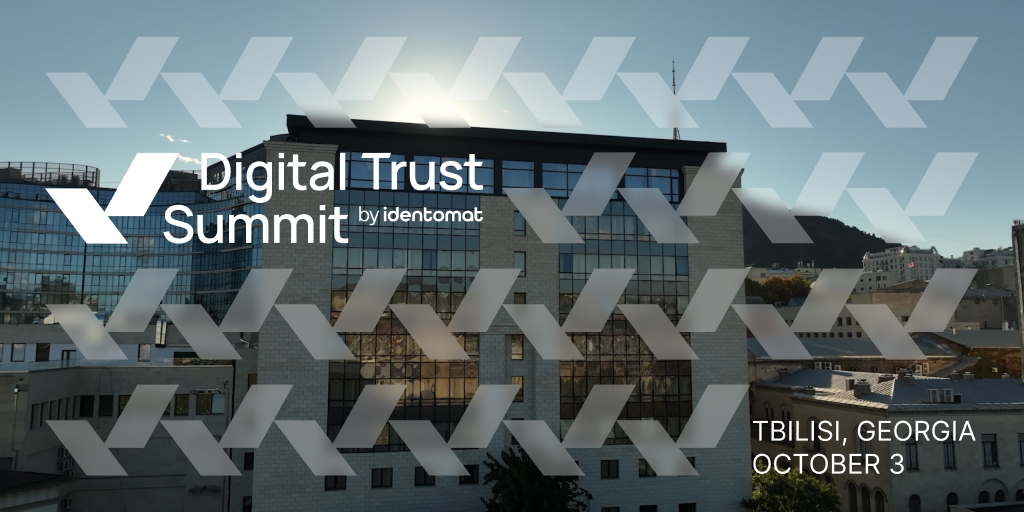Identomat CEO David Lomiashvili: Investors are Hungry for Enterprise-Level Application of AI
The year 2020 has been a rollercoaster so far, and we don’t see any signs of it slowing down. The same can be said for the industry. With all the recent developments, it’s crazy to think that Identomat was launched just 6 months ago. We have pried our CEO David Lomiashvili away from his busy schedule to share his insights from the recent TechCrunch event and its virtual format, what VCs and big-name investors are looking for these days, and what’s next for Identomat.
Can you share your impressions of the TechCrunch Disrupt2020 event? Was it what you originally expected?
The event was good. Granted that it’s our first TechCrunch event, and with the virtual format, introduced due to COVID, I truly didn’t know what to expect. Yet, TechCrunch has managed to assemble a great community, the topics of the sessions have been great, and I truly feel that the week had been well spent - even though I wish it hadn’t been for Covid and we could enjoy the good old-fashioned real life interactions.
Did the virtual format affect overall the experience? What’s your take on this format (since it seems like we’re stuck with it at least for some time).
Of course - the virtual format dictated the whole event experience, and in my opinion it has a lot of pros and cons. For instance, sessions and talks were super easy to attend. There had been a lot of great content, and it was easy to consume. You can easily switch between the topics and speakers, and pick out the aspects you’re most interested in. It would have been impossible to run between the physical pavilions, so in this case, the virtual format was a huge advantage.
And what about the disadvantages?
Those events are usually made awesome by people. We may be living a seemingly comfortable life in the digital space but there’s no substitute for in-person interaction, those random conversations you strike up while having coffee, or something. So, the networking was hard. I found it unnatural, to be honest. Developers of the platform have tried hard to recreate the experience of a physical pavilion, so from time to time people were matched up to chat. But if you, for example, miss that opportunity, there may not be another one.
Also, the booths didn’t feel the same. Being a digital experience, the booths are easier to prepare - you don’t have to worry about setting up the physical booth and keeping your fingers crossed that there are no last-moment printing mess-ups. Those digital booths do generate traffic and interest from the attendees, however, you cannot get too creative. Of course, no merchandise and branded freebies, and the only type of offer a digital booth could support were discount codes. I wish there had been more but believe that with the pace this online event technology has been developing, we would be in for a better ride in 2021. That said, it would be great for life to get back to normal.
Tell us more about the Pitchers and Pitches part? What was it like to pitch to the movers and shakers of the industry?
For me personally, the Pitchers and Pitches session was the highlight of the event! It was a unique opportunity to have your pitch examined by the key figures of the industry. Investors were sharing some truly valuable insights, so it was amazing and led to a huge value, especially with the virtual format.
Were you nervous during your pitch, and did it help that you could do it in the comfort of your home?
No, to be honest, it didn’t :). Don’t get me wrong, being able to enjoy this opportunity from the comfort of your couch is amazing and in a way mindblowing. But, when it comes to the actual pitch, this live human interaction is missing. Also, with the pitch being just one minute long, any delay in connection or some kind of a glitch will kill your effort on the spot. So, just thinking of that, got me nervous, even though it wasn’t my first pitch to VCs. However, with this format the margin of error was non-existent, and this just adds another layer of stress.
You’re not a newbie when it comes to the startup scene and raising funding. Given that, what was the biggest thing you have learned?
I have been sharing some brief takeaways on Identomat’s social media, but of course there’s much more. The startup scene is changing constantly, and some of those changes are happening in real time. For instance, 5 years ago all startups tried to market themselves to investors as “the Uber for X…” (whatever their focus was). Not so long ago, it was all about the sharing economy and untapped business opportunities. We saw this approach backfire more than once, so things have changed. Right now the trend is remote delivery of services.
Does it mean it’s harder to differentiate yourself? What are investors looking for?
Yes - differentiating a startup has become a challenge. But what investors are really looking for these days is the niche product and the niche market. Basically, VCs want you to master something, and then expand. Many startup founders want to hedge their risks and believe that spreading into a wider market could save them if things don’t pan out immediately. That said, this is where you can lose focus, so from an investors’ perspective they want you to be the “big fish in a small pond” - in the niche you know well. One of the questions we heard so much during the event was along the lines of knowing a certain secret. Basically, you need to know something that others don’t, and this will make investors go with you.
Has Covid impacted the investor-startup relations?
It definitely has. Before Covid, you had very low chance of an investor personally looking at your pitch deck. Right now, many of them actually have time to do it. So, your chances of getting in front of someone’s eyes are higher, but so is the competition.
Are any areas of technology particularly “hot” these days?
Yes. I’ve been told a lot that Artificial Intelligence is THE direction many VCs are looking at. Every technology has its own infliction level, and for AI, it’s now. Investors are looking for projects offering the application for Artificial Intelligence on an enterprise level. And this is exactly what Identomat offers.
What’s next for Identomat?
Just last week, we were accepted into NVIDIA Inception program for AI startups and are very excited about this opportunity. This virtual accelerator for AI Startups offers go-to-market support, expertise, and technology for program members through deep learning training, exclusive Inception events, preferred pricing on hardware, and more. We’re working on further developing the product and adding new features as we aim for a major expansion in the US market. So, a lot of time is spent on shaping our go-to-market strategy. Our international team is growing, and I feel that we’re in for a truly exciting ride.

Valentine’s Day 101: Swipe Right, Verify Twice By your ultimate Valentine - Identomat!


